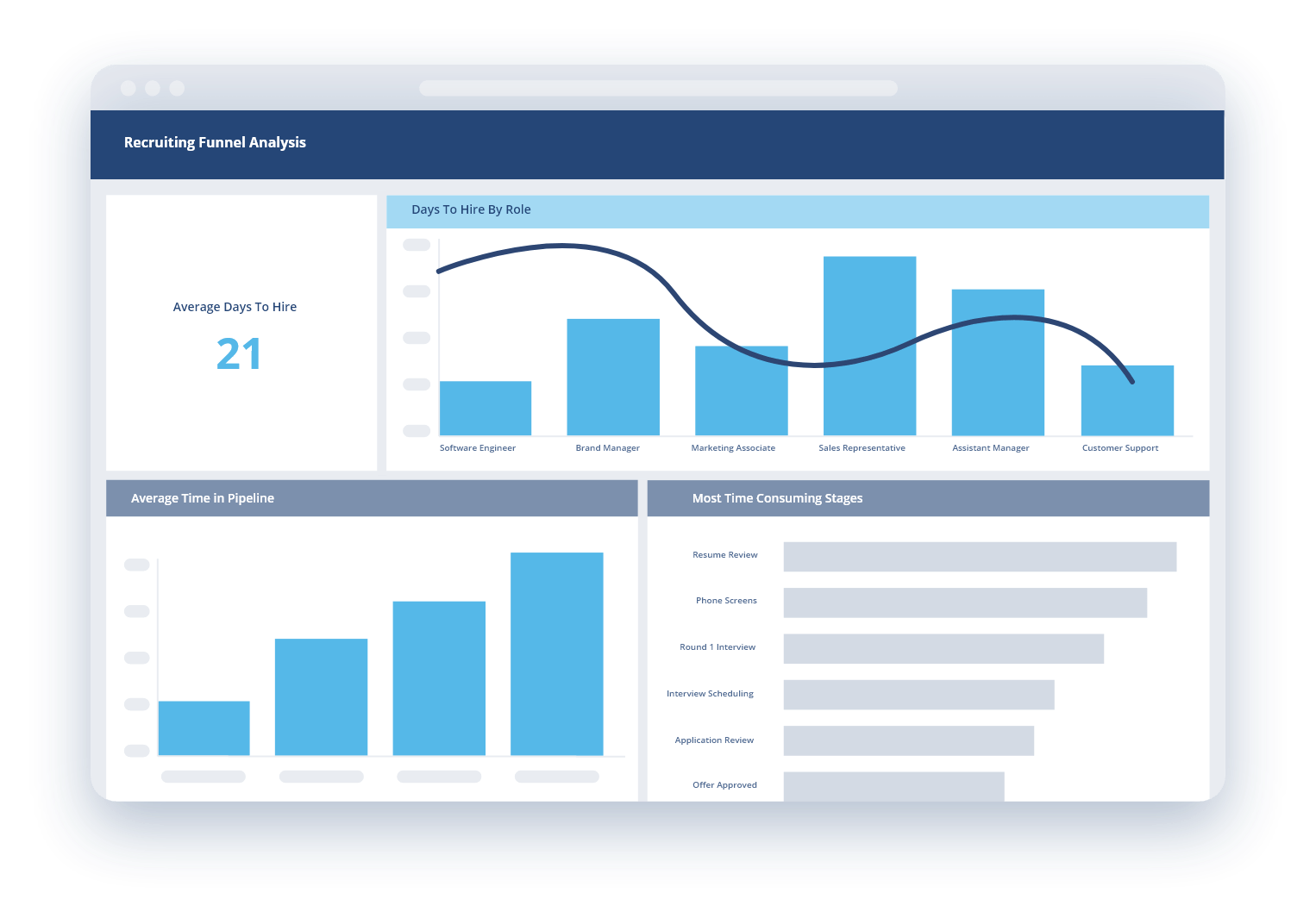This article about why HR teams need HR tech and analytics was originally published in June 2021.
It was updated in October 2023.
In human resources, we’ve always known that business outcomes hinge on the quality of your people. If you want a thriving business, you need thriving employees. Thriving employees are usually the result of effective HR strategies —which are the result of efficient HR processes.
And efficient HR processes? Those are the results of HR departments that are equipped with the right resources. Fortunately, the rest of the business realizes it now, too, and these days, HR strategy and business strategy are often one and the same. On top of an increased need for HR strategy aligned with organizational goals, experts don’t expect hiring and retaining top talent to get any easier.
To keep up with these demands, more and more companies are turning to HR tech and analytics for insights on how to increase their efficiency. The right HR analytics tools can have a real impact on your workflows and your workforce. When you can allocate resources where they’re really needed across your HR processes, they get better, and your HR team and employees benefit.
You need HR technology and analytics to stay ahead of the curve and hire, keep, and maximize high-quality talent. And since we believe in the importance of data-informed decision-making, we’ve compiled statistics and trends that showcase the necessity of modern HR analytics software.
#HRTech and analytics are a must for HR efficiency and talent maximization — but more than 80% of HR teams don’t have the tools they need:What Is HR Technology?
HR technology is, broadly, software used for various aspects of human resource management. Technology is commonly used to simplify a wide range of HR functions, from payroll and benefits administration to time and attendance tracking and talent acquisition to performance management. HR tech automates processes so HR can work smarter and save time. It’s also an effortless data collection, storage, and analysis tool.
Thanks to enhanced capabilities and advancements in artificial intelligence, HR technology can help to reduce the strain on HR teams, giving them more time to act strategically and analyze data to make informed decisions.
HR Analytics vs. Talent Analytics
HR analytics investigate HR processes and their impact on employees and the business. Talent analytics (also called people or workforce analytics) refers to the analysis of employee data specifically. Today’s best HR technology solutions offer tools to measure and track both talent and HR analytics metrics.
Rising Demand for Talent Management Technology
Talent management technology is necessary to collect data and give HR teams access to analytics tools —but many teams don’t have the resources they need. But, the growing market for HR technology shows that lots of companies are responding by investing in it. Is your business doing the same?
- More than 80% of HR teams say they lack the technology they need to execute their strategies effectively.
- 39% of HR leaders say their biggest human capital-related challenge is accessing insights and data analytics.
- The HR tech market is currently valued at over $31 billion and is expected to reach $76.5 billion by 2031.
- 60% of HR leaders expect to implement cloud-based administrative HR and talent management software by 2025.
- 54% of companies with over 500 employees say they plan to spend more on HR technology.
Recruitment and Hiring Technology Pays Off
Finding and hiring employees changed permanently in 2020, and we continue to see frequent changes today. Companies are hiring more remote employees, and often, they are fully remote. Following a surge in hiring and the Great Resignation, which increased already fierce competition for scarce talent, headcounts are steadying.
Despite slower hiring, there’s still a shortage of skilled talent across industries. HR teams need to meet job seekers’ expectations for excellent candidate and onboarding experiences —and retain them for more than a few months. HR technology and analytics can help teams improve recruiting and hiring processes and hire the right people for every role.
- 72% of business leaders said they’re investing in technology to recruit and retain their employees.
- HR spends more on technology for recruiting than for any other HR function.
- 44% of candidates say they’re open to using technology in the recruitment process.
HR Tech Supports Employee Performance and Engagement
Consider using HR tech to help facilitate employee development at your organization. With software and programs that support engagement and performance tracking, HR leaders can (and should) capitalize on the opportunity to create a highly productive workforce. See how organizations are using HR tech to better develop and track the performance of their teams.
- 59% of companies use HR analytics to improve employee engagement, and 58% use it for performance management.
- With remote work here to stay, 95% of companies are using or have a plan to use technology to track remote employees’ productivity and performance.
- 51% of HR leaders said skills management solutions are the most important emerging technology.
"The most significant challenge with data is not just collecting it, but also interpreting and synthesizing it into actionable information. Decide what information is crucial and how it should be organised. Remember, this isn't a one-time effort. It's an iterative process. Investing in technology, even with limited budgets is essential."
- Dr. Kanupriya Manchanda, Vice President-People at InfoBeans
The People Data Analytics Revolution
Data and people analytics help HR professionals to better gauge the productivity and efficiency of their teams. And with access to the right tools and information, analyzing HR data can help your leaders make more informed decisions that can help your business become more productive and profitable. That’s a powerful selling point, and it’s driving a data analytics revolution.
- 71% of HR leaders using people analytics said it’s essential to their strategy.
- 56% of HR leaders said reporting and analytics is their top area of investment.
- HR analytics managers are in high demand — they’re the second-fastest growing HR position with salaries of up to $122,000.
The evidence is clear — organizations want and need technologies and tools that offer data-informed insights for better decision-making. By equipping yourself and your team with the tools you need to succeed, you can create a more skilled and prepared workforce that understands the value of HR technology and data analysis.
ClearCompany Has the HR Analytics You Need
ClearCompany has over a decade of proven success in helping organizations reach their talent management goals. Our best-in-class HR software can be tailored to support your team’s needs and offers in-depth insights into the state of your workforce.
For more information about how ClearCompany can help you improve HR workflows and gain powerful data analytics tools, reach out to our team of experts to schedule your free demo.



